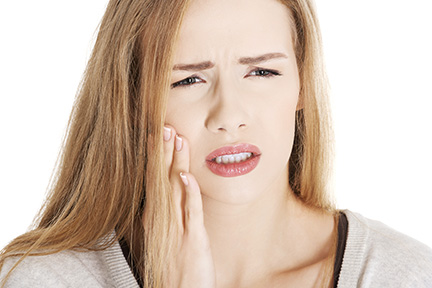 Tooth sensitivity is one of the most common complaints I encounter in the office, especially at this time of year when the weather gets frigid outdoors. Sensitivity results from exposure of the nerve endings that connect to the pulp tissue inside the tooth, commonly referred to as “the nerve”. This typically occurs when the protective tooth structure insulating the pulp is eroded or abraded away. So here are some tips that may help if you are experiencing this problem.
Tooth sensitivity is one of the most common complaints I encounter in the office, especially at this time of year when the weather gets frigid outdoors. Sensitivity results from exposure of the nerve endings that connect to the pulp tissue inside the tooth, commonly referred to as “the nerve”. This typically occurs when the protective tooth structure insulating the pulp is eroded or abraded away. So here are some tips that may help if you are experiencing this problem.
- Use a toothpaste designed to reduce sensitivity.
There is only one FDA approved active ingredient to reduce sensitivity – 5% potassium nitrate! This is contained in Crest Sensitive, Sensodyne Pronamel and several other over the counter toothpastes. The effectiveness of these toothpastes depends on regular usage over an extended period of time. Always check the ingredient labels to make sure they contain 5% potassium nitrate!
- Use a soft tooth brush.
As mentioned, sensitivity occurs when the protective outer layers of the teeth are lost from abrasion or wear. Overzealous scrubbing with a hard tooth brush is one cause that is easily avoided by using a soft brush and gently moving it in a circular motion along the gum lines. You will remove the disease causing dental plaque without promoting sensitivity.
- Keep up your routine
Those of you who have been with me for a while know that I give “homework” to our patients. Do it! Slacking off, i.e. around the holidays or while away at school, allows the bacteria in dental plaque to produce acids that further erode tooth structure. This promotes tooth decay, gum disease and of course, sensitivity.
- Make sure you are not grinding your teeth
Many of us grind our teeth when stressed, especially at night. Grinding (bruxism) creates premature and excessive wear on the teeth. This results in increased sensitivity and often sore jaw muscles. Check with your sleeping partner to make sure you’re not doing this at night. It’s more common than you think and is a major contributor to sensitivity.
- Avoid whitening toothpastes
Whitening toothpastes contain carbamide peroxide and frequently very abrasive compounds that wear away tooth structure. Carbamide peroxide becomes hydrogen peroxide in the mouth and promotes sensitivity. It should be avoided or at least done with professional supervision.
- Avoid acidic foods
Energy drinks, sodas and other acidic foods and beverages chemically erode tooth structure just like the bacterial plaque that live on our teeth. This promotes sensitivity. Occasionally when I indulge, as many of us do, I will rinse with water or chew some gum sweetened with xylitol to neutralize the acids immediately and then wait 30 minutes before brushing. Brushing too soon after consuming acidic foods can increase the amount of tooth wear!
I hope these few tips will help if you are experiencing tooth sensitivity. As always, please check with us if you experiencing this issue as sensitivity can also be a symptom of other and more serious problems. If you’re not certain about your technique, please ask us the next time you are in the office Don’t hesitate to contact me or the staff at my office, Dr. Laurence H. Stone, DDS, any time at 215-230-7667. We are only too happy to help. We look forward to seeing you soon!

